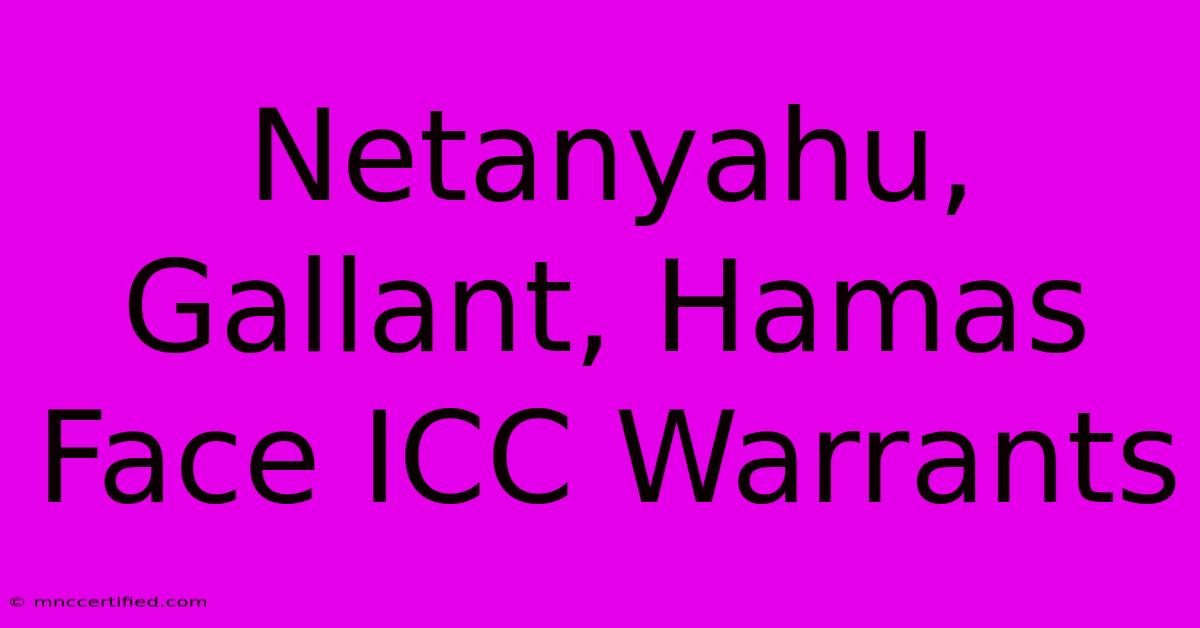Netanyahu, Gallant, Hamas Face ICC Warrants

Table of Contents
Netanyahu, Gallant, and Hamas Leaders Face Potential ICC Warrants: A Complex Legal Landscape
The escalating conflict between Israel and Hamas has thrust the International Criminal Court (ICC) into the spotlight, with potential investigations looming over key figures on both sides. This article delves into the complex legal implications and the potential consequences for Israeli Prime Minister Benjamin Netanyahu, Defense Minister Yoav Gallant, and Hamas leaders, focusing on the arguments for and against issuing warrants.
The ICC's Jurisdiction and the Palestine Situation
The ICC's jurisdiction in Palestine is a contentious issue. Palestine joined the ICC in 2015, granting the court the power to investigate alleged war crimes and crimes against humanity committed within its territories since June 13, 2014. Israel does not recognize the ICC's jurisdiction, arguing that the court lacks authority over its actions. This fundamental disagreement forms the basis of much of the ongoing legal debate. The ICC's investigation is ongoing, and the possibility of issuing arrest warrants for high-profile individuals on both sides is a significant development.
Arguments for ICC Action:
- Allegations of War Crimes: The recent conflict has witnessed numerous allegations of war crimes committed by both sides. Reports of disproportionate force, targeting of civilians, and the destruction of civilian infrastructure fuel calls for accountability under international law. Evidence collected by human rights organizations and independent investigations will be crucial for the ICC's assessment.
- Principle of Accountability: The ICC's mandate is to ensure accountability for the most serious crimes of international concern. Issuing warrants for individuals implicated in such crimes, regardless of their political standing, is essential for upholding international law and deterring future atrocities. Failure to act could send a dangerous message of impunity.
- Impartiality and Due Process: While accusations abound, it's vital to remember that the ICC's proceedings are designed to ensure impartiality and due process. Any warrants issued would be based on a thorough investigation and evaluation of evidence, not on political considerations.
Arguments Against ICC Action (primarily from the Israeli perspective):
- Disputed Jurisdiction: Israel vehemently rejects the ICC's jurisdiction over its actions in Palestine, citing its right to self-defense and the flawed premise of Palestinian statehood. They argue the court is politically biased against Israel.
- One-Sided Investigation: Critics allege that the ICC's investigation is disproportionately focused on Israel, neglecting alleged war crimes committed by Hamas and other Palestinian militant groups. This perceived bias fuels accusations of unfairness and undermines the court's legitimacy.
- Undermining Peace Efforts: Some argue that ICC involvement could further destabilize the already volatile situation and hinder peace negotiations. Focus should instead be on diplomatic solutions and conflict resolution, rather than criminal prosecutions.
Netanyahu, Gallant, and Hamas Leaders: Potential Targets?
The ICC Prosecutor's Office is examining allegations against numerous individuals on both sides of the conflict. Benjamin Netanyahu and Yoav Gallant, as key decision-makers within the Israeli government, could face scrutiny for their roles in military operations. Similarly, several Hamas leaders might face charges related to the launching of rockets into civilian areas and the handling of hostages. The evidence presented and the ICC's interpretation of international law will be pivotal in determining whether sufficient grounds exist to issue arrest warrants.
The Geopolitical Implications
The potential issuance of ICC warrants carries significant geopolitical implications. It could further strain relations between Israel and the international community, potentially impacting diplomatic ties and foreign aid. The response from other nations, especially key allies of Israel and Palestine, will be crucial in shaping the future course of events. The situation is extremely sensitive and any action taken by the ICC is likely to generate considerable global debate and reaction.
Conclusion: A Long and Uncertain Road
The path towards justice in the Israeli-Palestinian conflict is long and fraught with complexities. The ICC's potential involvement, while aiming to uphold international law and ensure accountability, presents significant challenges and uncertainties. The legal battles, political maneuvering, and international responses will continue to shape this evolving situation for years to come. The ultimate outcome hinges on a meticulous and impartial investigation, adhering strictly to international legal standards and ensuring due process for all parties involved.

Thank you for visiting our website wich cover about Netanyahu, Gallant, Hamas Face ICC Warrants. We hope the information provided has been useful to you. Feel free to contact us if you have any questions or need further assistance. See you next time and dont miss to bookmark.
Featured Posts
-
Motorcycle Insurance In Delaware
Nov 22, 2024
-
Family Receives Comfort After Ken Reids Death
Nov 22, 2024
-
Storm Bert Snow And Rain Forecast
Nov 22, 2024
-
Sales Atlanta Success Lakeland Grad
Nov 22, 2024
-
Commercial Crime Insurance Forms
Nov 22, 2024